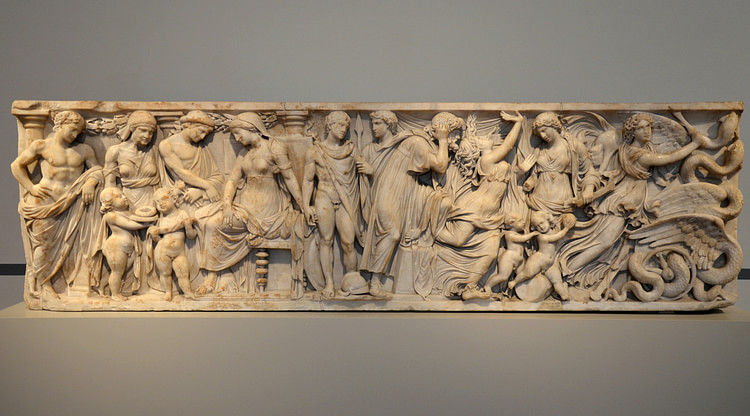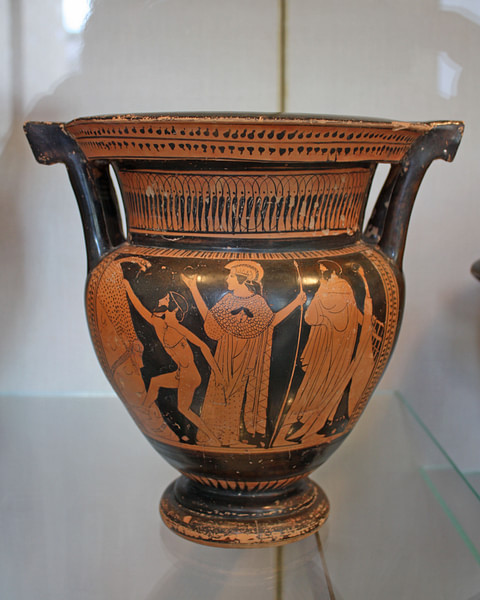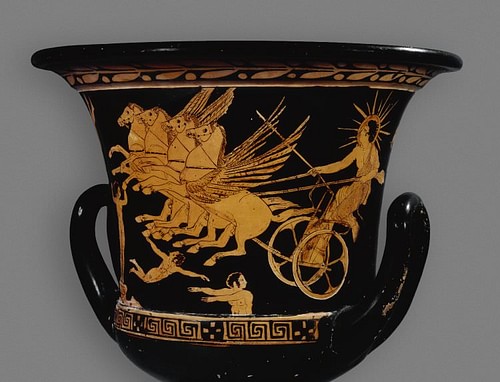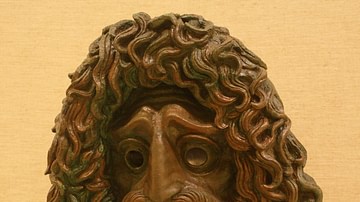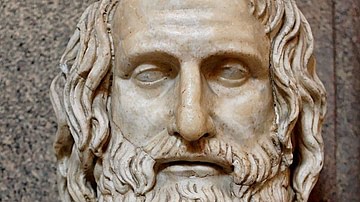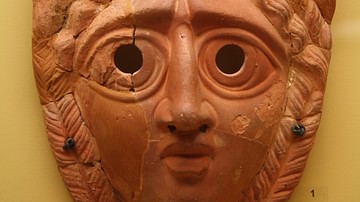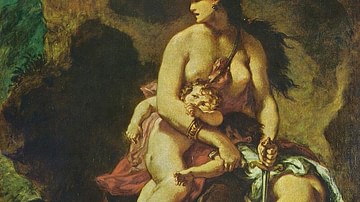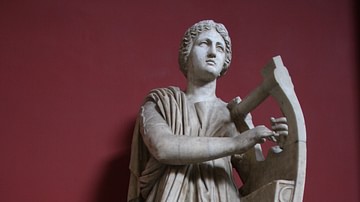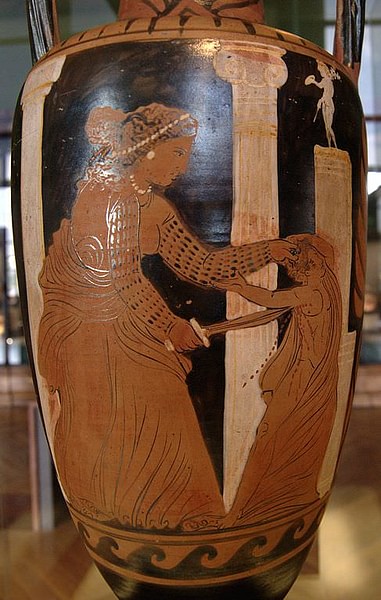
The tragedy Medea was written in 431 BCE by Euripides (c. 484 – 407 BCE). Euripides authored at least 90 plays of which 19 have survived intact. As with the plays by Sophocles and Aeschylus, the audience was already well aware of the myth surrounding Jason and Medea. However, Euripides' version is slightly different, for she emerges not as a cold-blooded murderer but as a suffering mother, maligned by an unfaithful rogue of a husband. Although unpopular when it was first presented, Medea would influence both Seneca and Ovid to author their own versions of the myth.
Euripides
Little is known of Euripides' early life. He was born in the 480's BCE on the island of Salamis near Athens to a family of hereditary priests. Although he preferred a life of solitude, alone with his books, he was married and had three sons, one of whom became a noted playwright. Unlike Sophocles, Euripides played little or no part in Athenian political affairs; the one exception was a brief diplomatic mission to Sicily. As with Sophocles and Aeschylus, his plays were performed in outdoor theaters and composed for competitions at various rituals and festivals. The intention of these performances was to not only entertain but also to educate the Greek citizen. Along with a chorus of singers to explain the action, there were two or three actors (always male) who portrayed various characters through masks and costumes. The poet made his debut at the Dionysia in 455 BCE, not winning his first victory until 441 BCE. Unfortunately, his participation in these competitions did not prove to be very successful with only four victories; a fifth came after his death.
The Greek philosopher Aristotle (384-322 BCE) called Euripides the most tragic of the Greek poets. Classicist Edith Hamilton in her book The Greek Way concurred when she wrote that he was the saddest, a poet of the world's grief. “He feels, as no other writer has felt, the pitifulness of human life, as of children suffering helplessly what they do not know and can never understand.” (205) With the Peloponnesian War waging, he left Athens in 408 BCE to live the remainder of his life in Macedonia. Although often misunderstood during his lifetime and never receiving the acclaim he deserved, he became one of the most admired poets long after his death, influencing not only Greek but Roman playwrights.
Main characters & the Myth
The entire play takes place at the home of Medea; flashbacks inform the audience of her time in her native Colchis and her arrival in Greece as a foreigner.
The characters are few:
- Medea
- Jason
- King Creon
- King Aegeus
- the children
- a nurse
- a tutor
- a messenger
- and the chorus.
According to the legend, the princess Medea of Colchis fell madly in love with Jason of Argonauts and helped him retrieve the Golden Fleece by using her powers of sorcery. She immigrated to Corinth with Jason where she would bear him two sons. Unfortunately, Jason decided to divorce Medea and marry someone more prominent, the daughter of Creon, the king of Corinth. Jason claimed he had the moral right to leave Medea for he had fulfilled his primary duty by bearing legitimate children. Medea did not take the news very well.
Creon approached Medea and informed her that she was to be exiled; he believed she might harm his daughter. Visibly upset, she begs for one more day, and she is granted her request. The king was right. Seeking revenge, she decided to kill not only Jason's new bride but also her children. Meanwhile, she was offered asylum in Athens by its king Aegeus. By the following day, she has not only poisoned Jason's bride but Creon as well. With the murder of her children, she confronts Jason. Hovering above him in the sky, she rides off in a chariot provided by her grandfather Helios, the sun god, leaving Jason standing alone without either a bride or children. This was Euripides' version. In other adaptations of the myth, she kills the children accidentally while trying to make them immortal or the citizens of Corinth kill them at the temple of Hera because of Medea's murder of the princess.
The Plot
The play begins sometime after Medea has learned about Jason's plan to marry King Creon's daughter. She is inside her home, crying and bemoaning about her plight. The children's nurse is outside, concerned about her mistress's mental state. She speaks to the audience:
… now hatred rules, and loyal love is sick since Jason has betrayed my mistress and their sons, by mounting the royal bridal bed beside the daughter of Creon, the monarch of this land, and so my poor Medea is disdained. (Grene, 74)
The nurse suspects that something horrible may happen for Medea now hates the children and takes no pleasure in the sight of them. She fears that Medea could even do them harm. When the children's tutor enters, they exchange a little gossip about what each of them suspects. He is concerned about Medea and wonders if she had stopped grieving. The tutor is told to keep the children away from their mother until she has stopped grieving.
The scene changes to Medea inside the house:
The suffering I have endured, endured, calling for bitter lament aloud! Accursed children of a hated mother, I wish you were done for along with your father. To hell with family, all of the house. (78)
She even begs for death. She speaks to the gods Artemis and Themis asking if they can see the pain she is suffering. She pleads that they rip the palace to pieces for what has been done to her. The nurse hears Medea's plea and adds - speaking to the gods - she fears for the children's safety but begs for the gods to help. Medea appears from inside the house and speaks to the audience of Jason. Addressing the women of Corinth about men in general, she says they believe women enjoy life, secure from danger, while they fight in wars. However, she would rather fight in battle than endure childbirth.
Manhandled from a foreign land like so much pirate loot … if I can find some means or some device to make my husband pay the penalty to quit me… (81)
King Creon approaches Medea and informs her that she must leave Corinth. She asks for the reason why he is expelling her. Creon replies: “I am afraid of you - no point in mincing words - I am afraid you'll work incurable mischief upon my daughter” (84). Medea assures him that it is Jason she hates, not the bride. Despite her pleas, Creon still holds to her being exiled.
He will even have her removed by force if necessary. Medea relents and asks only for one more day to make arrangements for her sons, and Creon agrees. After he leaves, she declares aloud:
… he's let me stay for this one day - the day on which I shall make dead meat of my enemies all three: the father and his daughter and my husband. (88)
Jason enters and approaches Medea, assuring her that she will not be left in poverty. First, she calls him a cheating rat and then reminds him how she had left her home after helping him acquire the Golden Fleece. Jason ignores her and says she has no one to blame for her exiles except herself. He has grown to hate her, but he still intends to treat her well.
I am prepared to hand out generously and to send tokens to my friends elsewhere to have them treat you well. If you refuse this, woman, you are a fool. Give up your anger fit, and you will be far better off. (97)
He leaves her standing alone. Aegeus, King of Athens, arrives to speak to Medea. He has come from the oracle of Apollo where he had asked how he might acquire children as his heirs. He understood that there was a prophet in Corinth that could help him. He asks why she has been crying. Medea relays her problems with Jason. The king sympathizes, and Medea adds that she can end his barrenness. “I shall make you potent to seed progeny. Such are the potions that I know.” (103) Aegeus promises her that if she can escape Corinth, he will give her asylum in Athens. After the king leaves, Medea prays to Zeus and says that she now has hope. Speaking to the audience, she divulges her plan. She will inform Jason that she wishes him well and has a present to give the princess, a finespun dress and plaited wreath of beaten gold. However, unbeknownst to anyone else, the dress will be poisoned. Concerning the fate of her children, she adds:
I grieve for the deed that I must do then that I must kill my sons - there is no one can spirit them away. (106)
Jason reappears as she has requested and Medea asks for his forgiveness. She calls for her children and assures them that she is no longer angry. Jason is pleased because her actions are of a woman who has finally become sensible. Medea assures him that she was only thinking of the children. They are to stay with Jason. She requests only that they will not be exiled. Jason leaves, and Medea and the tutor speak. The princess has been given the gifts. Turning to his children, Medea tells them that she is to be exiled. Speaking to herself, she realizes there is only one thing left to do:
…. there is no way I shall leave my boys among my enemies so they can treat them with atrocity. (117)
If they must die then it has to be by her hands. A servant arrives with news; the princess and her father are dead. She rejoices; it is excellent news.
My deed has been decided, friends —- as quickly as I can I'll end the children's lives and move on from this land. (124)
Medea exits and enters the house, saying “I'm a woman made of sorrow.” The children are killed off stage. Jason appears with the sword in hand that had killed his boys. Medea hovers above him in a chariot holding the bodies of her two sons. Jason speaks to her:
You are a thing of hate, woman most loathsome to the gods and me, and all humanity. (128)
No Greek would ever have done what she did. Medea tells him that Zeus knows what he has done. Jason grieves not only that he shall never share his marriage bed but also not share words with his two children again. Jason calls Medea a vicious mother, but she quickly responds that it was not her hand but his hand that killed them. She tells him that the gods know who is responsible. Jason asks for the bodies of his sons so he can bury them. No! Medea responds that they will be buried at the shrine of Hera. She adds that everything she did was meant to torture him. Medea flies away, leaving Jason standing alone - no wife, no children. Calling to Zeus, blaming the god for allowing this to happen:
...what I have suffered at the hands of this polluted, this children-devouring she lion. (133)
Interpretation
In Medea, Euripides portrayed a woman already known to the audience through the myth of the Argonauts and the hunt for the Golden Fleece. Some critics consider him to be a misogynist for his portrayal of women as being murderous and terrifying; however, he actually had deep respect and sympathy for women. Michael Grant in his book The Classical Greeks stated that the poet admired women for their sacrifice and pitied them for their suffering.
According to John Davie in the introduction to his translation of Euripides' play, the poet was intrigued by the mind of Medea. He believed she was not a heartless woman, but one who is suffering. As a foreigner in a strange land, she is presented as a pathetic victim, a tormented mother. She murdered not out of hatred but out of passion. Michael Grant claimed the play has a novel theme, the “power of passion.” Medea was transformed into a fiend by an intolerable wrong. Despite the darkness of her actions, she knew exactly what she was doing.
She is not depicted as a murderous, heartless mother. She is a victim, betrayed by a husband who wanted to marry another, someone more prominent. During his lifetime, Euripides saw his adopted city suffer through the hardships of the Peloponnesian War. He saw that the war not only affected the men who were fighting the battles but the women who remained at home. Euripides saw the evil beneath the war. As Hamilton wrote: “No poet's ear has ever been so sensitively attuned as his to the still, sad music of humanity…” (205). In some ways, Medea represented this suffering. Although Jason was not at war, she still felt betrayed and abandoned.
